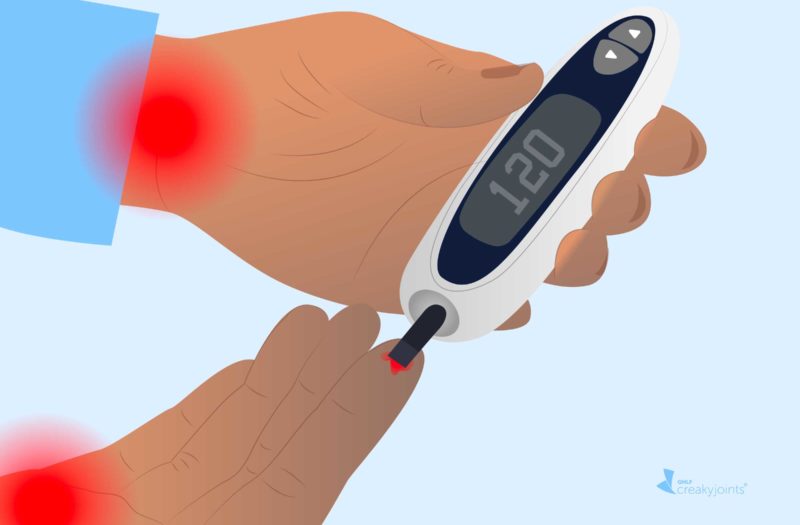On the surface, rheumatoid arthritis (RA) — a condition best-known for causing joint pain — might not seem like it has a lot in common with type 2 diabetes. Yet increasing evidence shows that rheumatoid arthritis and diabetes are often linked. The common denominator: inflammation.
Over the past few years, research has found that people with rheumatoid arthritis (RA) may face a higher risk of type 2 diabetes compared to the general population. High levels of inflammation-causing proteins (cytokines), including tumor necrosis factor (TNF) and interleukin-6 (IL-6) may be to blame. In fact, research shows that people who take RA drugs that target these proteins tend to have better blood sugar levels than those who don’t.
Yet many RA patients also take glucocorticoid drugs (steroids) which, unfortunately, may have the opposite effect by making blood sugar rise.
Clearly, the relationship between diabetes, rheumatoid arthritis, and the medications used to treat RA is complicated. Now a new study furthers the evidence connecting RA and type 2 diabetes.
In this study, published in the journal Rheumatology, researchers examined levels of insulin resistance and metabolic control (defined by average blood sugar levels of less than 140 mg/dL) of 167 people who had type 2 diabetes as well as arthritis.
Of those patients, 118 had RA and the remaining 49 had osteoarthritis (OA), which, unlike RA, is a degenerative joint disease caused by wear and tear over time and is not generally described as an inflammatory disorder. (So it stands to reason that inflammation would be less likely to play a role in diabetes in these patients.)
Although average blood sugar levels, as indicated by A1C tests, were similar overall among OA and RA patients, RA patients with bone erosions (a sign of more advanced RA) did have higher A1C scores. Additionally, RA patients had worse insulin resistance compared to OA patients — especially if they had high levels of RA disease activity. Insulin resistance means your body is not able to utilize insulin efficiently.
The Role of Rheumatoid Arthritis Medication and Insulin Resistance
As for the impact of medication, researchers found that RA patients who used TNF-blocking medication had better markers of insulin resistance compared to RA patients who were not using these drugs.
TNF blocking drugs are commonly prescribed biologic medications that include such medications as adalimumab (Humira), certolizumab pegol (Cimzia), etanercept (Enbrel), golimumab (Simponi, Simponi Aria), and infliximab (Remicade).
Previous studies have found that high doses of glucocorticoids, a class of hormones that can reduce inflammation and suppress the immune system, can raise blood sugar. In this study, however, most patients were only using low doses of glucocorticoids occasionally. Low doses of these drugs did not appear to have any impact on blood sugar. The researchers did not have any information on cumulative steroid use, so it’s hard to say whether taking low doses over a long period of time might make a difference.
“These findings may have therapeutic implications, with the potential targeting of insulin resistance through the treatment of joint and systemic inflammation,” researchers wrote.
In other words, it may be the case that controlling RA inflammation with medications may also reduce insulin resistance. More research is needed to determine whether this would translate to an overall improvement of diabetes, said lead study author Jérôme Avouac, MD, PhD.
It’s important to talk to your health care provider about your type 2 diabetes risk, whether or not you have diabetes, and how your arthritis treatment may be impacting your diabetes risk or management.
Track Your Medications with ArthritisPower
Join CreakyJoints’ patient-centered research registry and log your medications to track side effects and impact on disease activity. Learn more and sign up here.
Avouac J, et al. Influence of inflammatory and non-inflammatory rheumatic disorders on the clinical and biological profile of type-2 diabetes. Rheumatology. January 17, 2021. doi: https://doi.org/10.1093/rheumatology/keaa810.
Fookes C. Glucocorticoids . Drugs.com. August 15, 2018. https://www.drugs.com/drug-class/glucocorticoids.html.
Interview with Jérôme Avouac, MD, PhD at Hôpitaux Universitaires Paris Centre.
Nicolau J, et al. Rheumatoid arthritis, insulin resistance, and diabetes. Joint Bone Spine. July 2017. doi: https://doi.org/10.1016/j.jbspin.2016.09.001.






